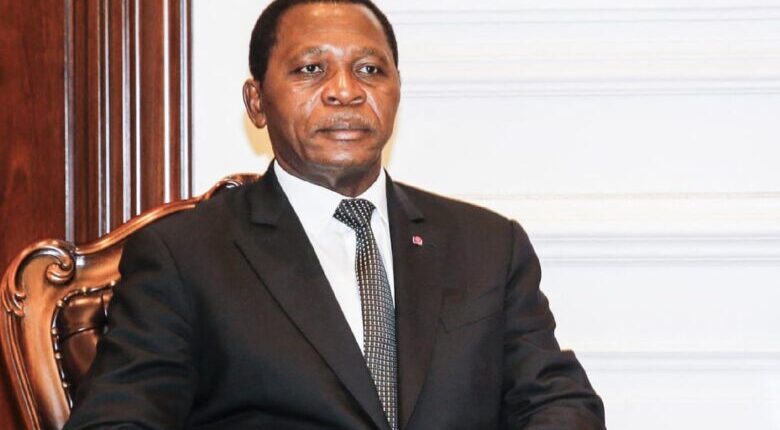Atanga Nji Vows to Crush “Ghost Towns” Ahead of Presidential Polls, But Ambazonia Responds: “They’re Coming—Like It or Not
By Andre Momo
With Cameroon’s presidential election slated for October 12, 2025, Minister of Territorial Administration Paul Atanga Nji has once again taken center stage with his trademark hardline rhetoric. In a recent press briefing, the controversial minister pledged that “nothing will be left to chance” before, during, and after the poll—warning against “gangsterism, ghost towns, and other civil disobedience” that marred earlier electoral cycles, particularly in 1992.
But as his declarations echo across the national media, a growing chorus of defiance is rising from Ambazonian leaders, activists, and communities, who have already declared that ghost towns will not only return—they will intensify.
Atanga Nji’s Iron Fist Warnings
Minister Atanga Nji, long viewed as the regime’s enforcer in the Anglophone regions, insisted that no form of disruption would be tolerated, and appeared to single out the Anglophone-led civil resistance tactics as a national threat:
“We will not tolerate a repeat of 1992. The state will act decisively against any attempt to destabilize the republic under the guise of ghost towns or civil disobedience,” he declared, flanked by security chiefs in Yaoundé.
These remarks, however, only served to reignite tensions with Anglophone communities in the North West and South West, many of whom view ghost towns as a non-violent and symbolic tool of resistance against the Yaoundé regime’s broken promises, cultural erasure, and military brutality.
Ghost Towns: The People’s Protest, Not “Gangsterism”
Originally launched during the early phase of the Anglophone Crisis in 2016, ghost towns—city-wide shutdowns every Monday and during national events—have become an enduring symbol of civil resistance across Ambazonia. Despite heavy militarization, arrests, and crackdowns, residents have largely complied with these stay-at-home orders, sometimes at great personal and economic cost.
To many in the Anglophone regions, ghost towns are not criminal behavior—they are a protest against the collapse of trust in state institutions, legal discrimination, and violent repression.
“Ghost towns are not imposed by gangs,” said a teacher in Bamenda who asked to remain anonymous. “They’re the people’s decision. They’re a message. If Biya and Atanga Nji still don’t understand that in 2025, they never will.”
Ambazonian Activists: “We Dare You to Stop Them”
In swift reaction to Atanga Nji’s remarks, prominent Ambazonian activists and diaspora leaders fired back, accusing the minister of provocation and historical amnesia.
“Ghost towns are coming—like it or not,” said one declaration circulating in activist circles. “If Atanga Nji wants to fight the people’s will with soldiers, he will get resistance in return. We are not afraid. We will remember our martyrs with silence, not noise.”
Other leaders, including exiled Ambazonian figures, warned that any attempt to forcefully dismantle ghost towns would lead to escalated confrontation, particularly during the sensitive election period.
“Atanga Nji can threaten all he wants, but we’ve been burying our dead since 2016. We will not stop now,” wrote one senior Ambazonian commander in a message shared via encrypted platforms.
Election or Occupation?
The October 2025 election, expected to once again feature nonagenarian Paul Biya, is viewed by many in the Anglophone regions as irrelevant—a ritualistic recycling of power that excludes and marginalizes them. Activists argue that even if ghost towns weren’t enforced, voter turnout in Ambazonia would be negligible, as many no longer see themselves as part of the Cameroonian state.
“Why should we participate in the illusion of democracy?” said a youth activist in Kumba. “The roads are patrolled by soldiers, our towns are under curfew, our leaders are in jail or exile. Let Atanga Nji run his election alone.”
Power Meets Resistance
Paul Atanga Nji’s warning may reflect Yaoundé’s desire to project strength, but it also reveals a deep misunderstanding of what ghost towns truly represent. They are not about fear or coercion—they are about remembrance, defiance, and protest, in a context where citizens feel unheard and unprotected.
As the election nears, the battle lines are clear: official decrees versus grassroots disobedience, state power versus historical injustice, military might versus civilian memory.
And come election day, the streets of Buea, Bamenda, Kumbo, and Kumba may again fall silent—not in surrender, but in sovereign rejection.





